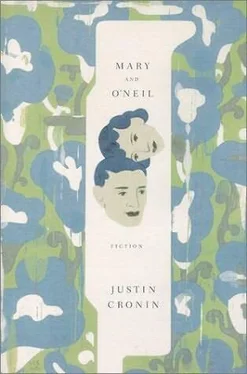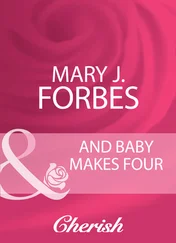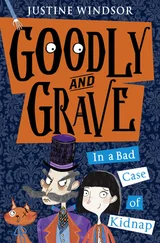“In a way we’re better friends now than we were before,” Kay told him. They were folding warm towels at the kitchen table; it was early summer, and the boys were at the pool with friends. “All those years, I waited for him to get the hang of it. When I stopped asking for that to happen, I could appreciate him for what he is.”
“Okay, what is he?”
He’d meant it as a joke, but O’Neil could tell he had startled her. She snapped a towel into form and folded it across her chest with her thin arms. “He’s the boys’ father, O’Neil. He’s not a bad man. I know you think he is, but he’s really all right.” She sighed and looked away. “He just can’t face this sort of thing.”
Every three weeks she returned to the hospital for her infusions, and if one of these weeks coincided with his visits, O’Neil would take her. For the hour before these trips Kay would say nothing; an expectant quiet fell over the house, and O’Neil knew it was time to go when he saw her in the hallway putting on her coat or, in summer, a light sweater and a scarf, for the chills that came after. The hospital had a special parking lot for cancer patients, and inside there was a room of upholstered easy chairs facing a large television, though in all of O’Neil’s visits he had never seen anyone turn it on. O’Neil had heard some of the other patients call this room “the gas station.” It had been decorated to suggest a den or basement rec room, but the floor was bare linoleum and beside each chair there was a rolling tray of supplies: gauze and tape, needles holstered in cellophane, basins. Many of the other patients chatted away with one another like customers at a hair salon, and scheduled their treatments to coincide with one another’s. They introduced themselves to O’Neil by citing both their profession and their illness-Peter, for instance, was a mechanical engineer with chronic lymphocytic leukemia, Delores a lawyer with the state’s attorney’s office who had ovarian cancer-and when next they saw him, they always asked him specific questions about his life: his daughters, his teaching, the movies he had seen and the books he had read. Then a nurse would set up the IV of clear liquid for Kay, and while the medicine dripped into her arm, the two of them read magazines and listened to the new CDs O’Neil brought with him each time he visited: Charlie Parker, the Beatles’ “White Album,” a new recording of the Brandenburg Concertos. Sometimes Kay received an injection first, to control the nausea, and fell asleep at once, leaving O’Neil to watch over her, listening through his headphones to the same music on which his sister floated into dreams.
Her weight plummeted, stabilized, plummeted again; by midsummer her hair was mostly gone. In August there was a break in her treatments, and O’Neil rented a house for all of them on the Jersey shore. He had taken it sight unseen, over the phone, but it was perfect: a charming cottage on a quiet street that ended at stairs and the beach. He had lied to his sister about how much it cost, which was fifteen hundred dollars for the week. It took him two days before he realized his mistake. Her bony body, one breast gone, her balding head impossible to really hide, no matter what hat she wore: of course it would break her heart to be at the beach. She took off her T-shirt or robe only to swim; everywhere she looked she would see golden, healthy bodies in the sun. The next morning he drove around town, looking for a barbershop, but had to settle for an expensive salon called Trendz.
When his turn came, he sat in the chair. “Short,” he instructed.
The girl was slowly chewing gum; she was very attractive, with hazel eyes and silver bracelets all up and down her bare arms. She held her comb and scissors slightly raised, like a conductor preparing to lead an orchestra. She spoke to him through the wide mirror.
“How short, exactly?”
O’Neil nodded. “All of it,” he said.
She used scissors, then clippers, and finally a safety razor to scrape his scalp clean. At the first touch of the blade O’Neil felt the coolness of air on skin that had not felt it since the first days of his life. When she was done, he ran his hand over it again and again, amazed. And yet his face in the mirror was the same.
“I don’t get many requests for something like that,” the girl said, bewildered. “A lot of older guys come in here and actually want me to somehow make it longer.”
He paid her, tipping generously, and returned to the house. It was lunchtime, and Mary and the children were making sandwiches in the kitchen. Sam, reading at the kitchen table, saw him first and started to laugh.
“Holy shit, O’Neil,” he said. “You look like a white Michael Jordan.” But his face was proud-he understood what O’Neil had done.
Nora giggled. “Daddy lost his hair,” she sang. “Bald man, bald man.”
“Hush,” Mary said. She put down the knife she had been using to spread peanut butter onto sandwiches for the children. She wiped her hands on a dish towel and looked at him. “O’Neil?”
He shrugged. “It’s just something I’ve been meaning to try for a while. What do you think? It feels great.”
She narrowed her eyes, tilted her head this way and that to examine him. “Well, I think I like it. I really do. Turn around and let me see the back.”
He did, pivoting toward the doorway in time for Kay to enter the room and meet his gaze. She stepped forward and touched his bare scalp. Tears floated in her eyes, and O’Neil’s heart constricted: another mistake?
“Oh, honey,” she said, and laughed. “Is that what I look like? You look just awful.”
That evening the two of them went down to the ocean to swim. Kay had asked him if he could get some marijuana for her, to help her appetite, and he brought it with him to the beach-three joints, tightly wrapped in green and red paper, like little Christmas presents. It had been years since he’d smoked it; he’d bought it from a friend of Mary’s, a sculptor she’d known in graduate school, who knew someone who knew someone else-the road it had traveled to him was obscure. Why had Kay thought that he, of all people, would be able to get it? And yet he had, and done it with ease. O’Neil had planned a big meal to follow it: spaghetti with clam sauce, a salad of mixed greens, fresh sweet corn slabbed with butter, and a key lime pie for dessert. He’d told her nothing about this; the meal was an ambush. The joints were in a Baggie, and after their swim, he took one out and lit it, somehow, in the wind.
“I feel like I’m in high school,” she said, and took the joint from him. “I mean that in a good way.”
The smoke tasted like pepper on his tongue. They finished about half the joint before the wind blew it out, and O’Neil returned it to the bag. The pot he’d had in high school and college was all stems and seeds-sometimes they smoked through the night and barely caught a buzz-but everything he’d heard told him that, these days, half a joint would probably be more than enough for his purpose. Sure enough: he looked around and discovered that, already, the scenery seemed a little fluttery, like a movie just slightly out of synch. This fact was also elusively funny.
“How are you feeling?” he asked.
She was sitting cross-legged on the sand, her legs covered by a towel. He saw her eyes had closed. “Choirs of angels are soaring from the heavens, singing the Hallelujah Chorus.” She turned, wide-eyed and grinning, to look at him. “No, but seriously, I am stoned. It’s like 1979 all over again. Where did you get this stuff?”
O’Neil shrugged. “Apparently not much has changed in this regard. A few calls, next thing you know, a car’s in the driveway and money’s changing hands.”
Читать дальше












